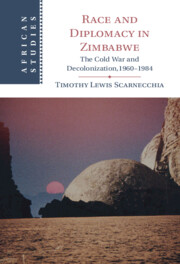Book contents
- Race and Diplomacy in Zimbabwe
- African Studies Series
- Race and Diplomacy in Zimbabwe
- Copyright page
- Contents
- Figures
- Acknowledgments
- Abbreviations
- Introduction
- 1 Historical Background
- 2 The Early 1970s
- 3 Liberation Struggles in Southern Africa
- 4 “We Don’t Give a Damn about Rhodesia”
- 5 Negotiating Independence
- 6 Negotiating Independently
- 7 The Big Gamble
- 8 The 1980 Elections and the First Years of Independence
- 9 Gukurahundi and Zimbabwe’s Place in the 1980s Cold War
- Conclusion
- Select Bibliography
- Index
- African Studies Series
4 - “We Don’t Give a Damn about Rhodesia”
The Geneva Talks, 1976
- Race and Diplomacy in Zimbabwe
- African Studies Series
- Race and Diplomacy in Zimbabwe
- Copyright page
- Contents
- Figures
- Acknowledgments
- Abbreviations
- Introduction
- 1 Historical Background
- 2 The Early 1970s
- 3 Liberation Struggles in Southern Africa
- 4 “We Don’t Give a Damn about Rhodesia”
- 5 Negotiating Independence
- 6 Negotiating Independently
- 7 The Big Gamble
- 8 The 1980 Elections and the First Years of Independence
- 9 Gukurahundi and Zimbabwe’s Place in the 1980s Cold War
- Conclusion
- Select Bibliography
- Index
- African Studies Series
Summary
This chapter examines the ways in which the Geneva conference of late 1976, as the culmination of American efforts to push forward with majority rule talks, failed to reach any meaningful results. Part of the failure had to do with the end of President Ford’s administration and the end of Secretary of State Henry Kissinger’s role in the Rhodesia crisis. Much of the chapter analyzes the diplomatic roles of Robert Mugabe and Joshua Nkomo, and how they interacted with American, British, and African diplomats and leaders during the conference. The Zairian leader Mobutu was also involved in assessing the African leaders, and his observations of Mugabe and Nkomo are discussed. The chapter shows how Mugabe managed to make the most of the otherwise failed Geneva talks to solidify his leadership role in ZANU, and how after the conference, he and ZANLA leader Tongogara removed the ZIPA leaders by having them imprisoned in Mozambique in early 1977. The chapter also examines British, American, South African, and Rhodesian views of the future prospects of the Zimbabwean nationalist leaders.
Keywords
- Type
- Chapter
- Information
- Race and Diplomacy in ZimbabweThe Cold War and Decolonization,1960–1984, pp. 96 - 130Publisher: Cambridge University PressPrint publication year: 2021

